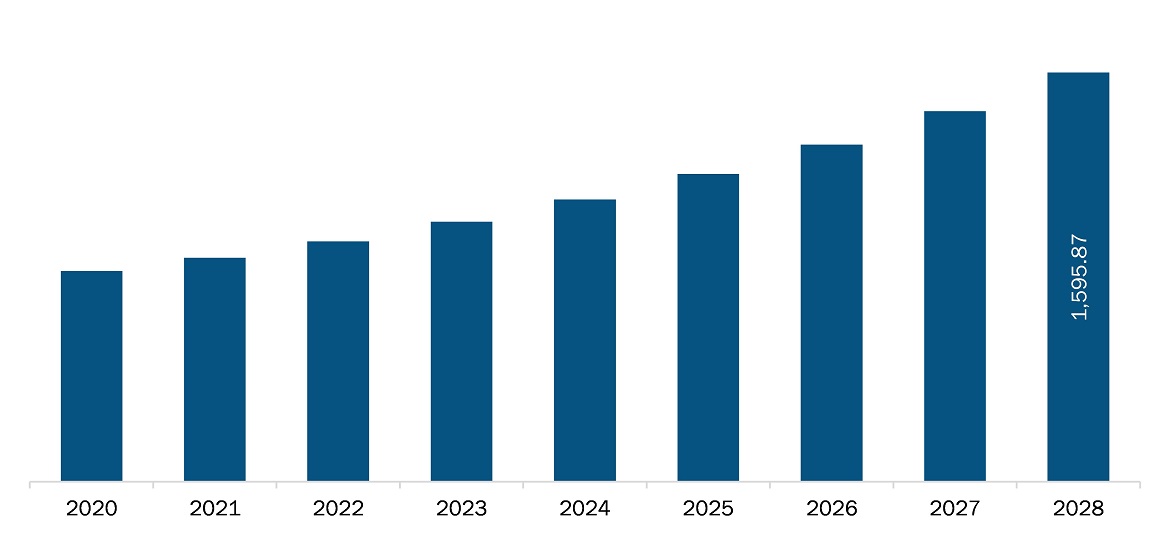The protein expression market in North America is expected to grow from US$ 872.9 million in 2021 to US$ 1,595.9 million by 2028; it is estimated to grow at a CAGR of 9.0% from 2021 to 2028.
The burden of dengue is rapidly increasing and will continue until the development of an effective vaccine against it. Various vaccine candidates for dengue are at preclinical and clinical trials stages of development based on different approaches. A few vaccines are a tetravalent, live attenuated virus, purified inactivated virus, recombinant proteins subunit, plasmid DNA, and virus-vectored dengue vaccines. Recent progress on recombinant subunit-based dengue vaccine candidates using various approaches, such as fusion with other immunogenic epitopes, use of a novel adjuvant, protein expression in different host systems, designer vaccine, and VLPs development, is opening new avenues for the development of a fully efficacious vaccine against dengue. Currently, more than 65 million confirmed cases and over 1.5 million deaths are reported. The COVID-19 pandemic has led to significant health, social, and economic crises. The development of a vaccine for COVID-19 is an effective strategy to control the outbreak. It is required that the vaccine is produced at high speed and is easily scalable. Recombinant protein, viral-vectored or nucleic acid-based (recombinant plasmid DNA and mRNA) vaccines need to be considered to shorten the vaccine production timeframe. The use of protein expression is increasing during vaccine development due to the advantages of recombinant protein, which drives the growth of the protein expression market.
As the current pandemic is demonstrating across the region, the pharma industry can respond robustly to the health crisis but at a cost that society may not be able to sustain under current bioprocessing development and manufacturing models. Centuries of detecting, responding, and treating pandemics have taught that if a virus (or any biologic threat) is extremely infectious and transmittable, it can spread quickly and propagate in vast numbers of people, quickly jumping social distance, borders and the ability of healthcare systems to treat the sick. The way vaccines are developed and rolled out today is about the same as it has been for the past several decades. Currently, the region mainly relies on Chinese Hamster Ovary (CHO) cells or insect cells for expression as the gold standard, but its expense and processing complexity is driving developers to consider emerging cell line (hosts in which to express these proteins and vaccines) alternatives. To help combat the Covid-19 outbreak Dyadic International, Inc. developed a hyper productive C1 cell line that produces a SARS-CoV-2 Receptor Binding Domain (RBD) antigen from the Dyadic C1 gene expression platform that expresses the RBD antigen at three grams per liter (3.5 g/l) in only four days. The impact of the COVID19 pandemic on the regional protein expression market is high.
With the new features and technologies, vendors can attract new customers and expand their footprints in emerging markets. This factor is likely to drive the protein expression market. The North America protein expression market is expected to grow at a good CAGR during the forecast period.

- This FREE sample will include data analysis, ranging from market trends to estimates and forecasts.
North America Protein Expression Market Segmentation
By Product
- Competent Cells
- Expression Vectors
- Reagents
- Instruments
By Services
- Antibody Development & Production
- Protein Expression & Production
- Hybridoma One-Stop Services
- Stable Cell Line Development
- Bioanalytical Assay Services
By Application
- Research
- Therapeutic
- Industrial
By End User
- Pharmaceutical and Biotechnology Companies
- Contract Research Organizations
- Academic Research Institutes
- Others
By Country
-
North America
- US
- Canada
- Mexico
Companies Mentioned
- Thermo Fisher Scientific Inc.
- GenScript
- Merck KGaA
- Agilent Technologies, Inc.
- Takara Bio Inc.
- Bio-Rad Laboratories Inc.
- QIAGEN
- New England Biolabs
- Promega Corporation
North America Protein Expression Report Scope
| Report Attribute | Details |
|---|---|
| Market size in 2021 | US$ 872.9 Million |
| Market Size by 2028 | US$ 1,595.9 Million |
| CAGR (2021 - 2028) | 9.0% |
| Historical Data | 2019-2020 |
| Forecast period | 2022-2028 |
| Segments Covered |
By Product
|
| Regions and Countries Covered |
North America
|
| Market leaders and key company profiles |
|
- Historical Analysis (2 Years), Base Year, Forecast (7 Years) with CAGR
- PEST and SWOT Analysis
- Market Size Value / Volume - Regional, Country
- Industry and Competitive Landscape
- Excel Dataset
Recent Reports
Testimonials
Reason to Buy
- Informed Decision-Making
- Understanding Market Dynamics
- Competitive Analysis
- Identifying Emerging Markets
- Customer Insights
- Market Forecasts
- Risk Mitigation
- Boosting Operational Efficiency
- Strategic Planning
- Investment Justification
- Tracking Industry Innovations
- Aligning with Regulatory Trends






















 Get Free Sample For
Get Free Sample For